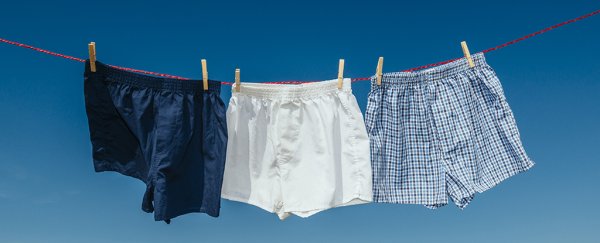Boxers or briefs? It's a question faced by every man buying underwear, but it's also the subject of a new study that concludes boxers are indeed the best option – at least as far as higher sperm concentrations go.
Not only were sperm concentrations higher in the boxer-wearing men in the research, but levels of the sperm-producing follicle-stimulating hormone (FSH) were lower, suggesting FSH kicks into gear to compensate for damage done by tight-fitting underwear, which may be creating a toasty environment that kills off sperm.
While we've seen studies like this before, the new research includes a higher-than-usual number of participants (656), and looks at a variety of different aspects of sperm quality. That makes it a useful barometer of how underwear choice affects fertility in men, according to the team behind it.
"An important strength of this study is that we were able to investigate the potential relationship between the type of underwear worn and indicators of testicular function such as reproductive hormone levels and DNA damage," says one of the researchers, Lidia Mínguez-Alarcón from the Harvard T.H. Chan School of Public Health in Boston.
Out of the 656 men who took part, 345 or 53 percent reported wearing boxer shorts most of the time. On average, these men had a 25 percent higher sperm concentration, 17 percent higher total sperm count, 33 percent more swimming sperm in a single ejaculate, and 14 percent lower FSH levels than the other men.
That's compared to men who wore briefs, 'bikinis' (very brief briefs), 'jockeys' (underwear that finishes just above the knee), and other restrictive underwear. Terms in your part of the world may vary, of course.
According to the scientists, when the heat generated by tight-fitting underwear causes sperm levels to drop, the brain releases the gonadotropin hormone to compensate, which is reflected by the increased levels of FSH. For now though, that's just a hypothesis.
We'll need further research to find out for sure. While a link between higher scrotal temperatures and decreased sperm count is now well established, what's less clear is how much effect underwear has.
The statistics were weighted to account for other factors, including body mass index, physical activity, and even how many hot baths each individual took.
No statistically significant differences were found in other reproductive hormones or in the damage to the DNA of the sperm.
One of the limitations of the study to bear in mind is that the participants were all attending a fertility centre, rather than being drawn from the general population.
There might also be extra factors involved – like tight-fitting jeans – that the study doesn't account for. As a result it's too soon to say that more restrictive underwear is actually the cause of lower sperm concentrations.
Nevertheless, with the relatively high sample size and the range of types of analysis done, it's solid evidence that there's a link here somewhere. While we wait for further research, you might want take it into consideration the next time you (or your significant other) is buying underwear.
"Since men can modify the type of underwear they choose to wear, these results may be useful to improve men's testicular function," says Mínguez-Alarcón.
The research has been published in Human Reproduction.
